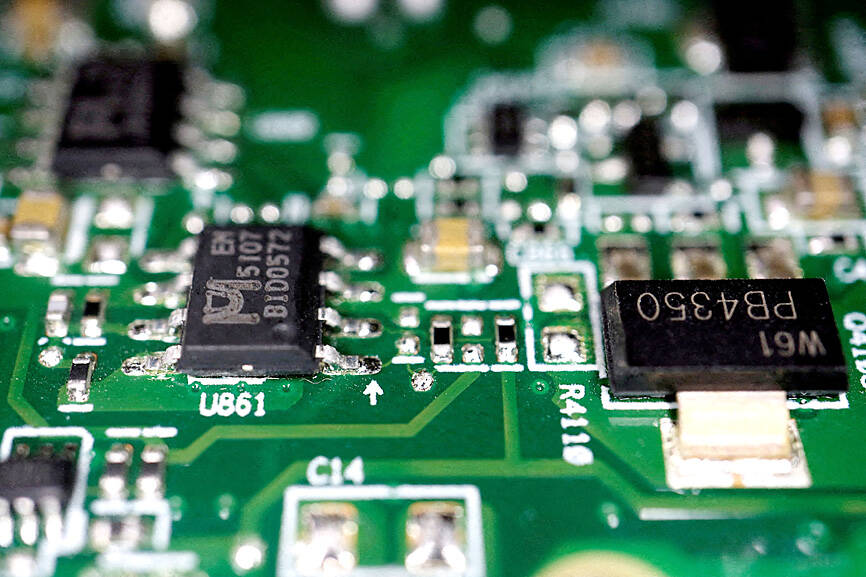The Ministry of Education is to expand the pilot program of semiconductor education to cover 35 senior-high schools.
The ministry has extended semiconductor education to senior-high schools and vocational schools, and worked with 11 schools in the pilot program for the 2023-2024 academic year, sources said yesterday.
The program is to be expanded for the 2024-2025 academic year, which starts next month, and has received applications from about 100 senior-high schools, they said, adding that 35 would be selected.

Photo: Reuters
Nominated teachers and curricular content are being reviewed by the ministry, the sources said.
High-school students from art and science streams could register for the semiconductor courses, with more than 1,000 students having done a course a year from now, they added.
The semiconductor curriculum for senior-high school students was developed in the 2022-2023 academic year, in line with the government’s policy to cultivate talent for the semiconductor industry, the ministry’s Education Administration official Huang Ching-yi (黃?儀) said.
The curriculum includes “the scientific knowledge of electricity,” “the principle of semiconductors,” “the manufacturing process of semiconductors,” “semiconductor applications in life,” “circuit designs” and “the social aspect” at the beginner, intermediate and advanced levels, along with practical classes, Huang said.
Selected schools may arrange one or two-credit courses for each academic year or provide micro-lectures under the “flexible learning” scheme based on teachers’ expertise, curricular features and students’ needs, she said.
Industrial and academic resources could also be introduced to the high schools, such as collaborations with college laboratories and lectures by industry professionals or college professors to boost the students’ practical and problem-solving skills, Huang said.
The semiconductor curriculum, including course-introduction videos and teaching materials for practical classes, would be discussed and designed by high-school teachers, National Taiwan Normal University Affiliated Senior High-School teacher Hung Yi-wen (洪逸文) said, adding that the principles and applications of semiconductors would be covered in the curriculum framework.
Taiwan’s next generation must build the semiconductor competency, not just to catch up with the information age, but to also develop an understanding of the scientific principles, industrial ecosystems and international geopolitics related to semiconductors, Hung said.
Students of the art stream are also encouraged to take semiconductor courses in high schools to learn about the semiconductor industry from the global trade and international relations perspectives, he said, adding that such courses would be jointly taught by teachers from scientific and social fields.
The Taipei Municipal Nangang High School was the first to implement the ministry’s semiconductor curriculum and was selected by 28 freshman-year students, school physics teacher Cheng Hsiang-ti (鄭翔帝) said.
The biggest challenge is to succinctly explain the complicated principles of semiconductors to high-school students, while also using practical classes to spark their learning interest and equip them with applicable skills, he said.

The inspection equipment and data transmission system for new robotic dogs that Taipei is planning to use for sidewalk patrols were developed by a Taiwanese company, the city’s New Construction Office said today, dismissing concerns that the China-made robots could pose a security risk. The city is bringing in smart robotic dogs to help with sidewalk inspections, Taipei Deputy Mayor Lee Ssu-chuan (李四川) said on Facebook. Equipped with a panoramic surveillance system, the robots would be able to automatically flag problems and easily navigate narrow sidewalks, making inspections faster and more accurate, Lee said. By collecting more accurate data, they would help Taipei

STATS: Taiwan’s average life expectancy of 80.77 years was lower than that of Japan, Singapore and South Korea, but higher than in China, Malaysia and Indonesia Taiwan’s average life expectancy last year increased to 80.77 years, but was still not back to its pre-COVID-19 pandemic peak of 81.32 years in 2020, the Ministry of the Interior said yesterday. The average life expectancy last year increased the 0.54 years from 2023, the ministry said in a statement. For men and women, the average life expectancy last year was 77.42 years and 84.30 years respectively, up 0.48 years and 0.56 years from the previous year. Taiwan’s average life expectancy peaked at 81.32 years in 2020, as the nation was relatively unaffected by the pandemic that year. The metric

TAKING STOCK: The USMC is rebuilding a once-abandoned airfield in Palau to support large-scale ground operations as China’s missile range grows, Naval News reported The US Marine Corps (USMC) is considering new sites for stockpiling equipment in the West Pacific to harden military supply chains and enhance mobility across the Indo-Pacific region, US-based Naval News reported on Saturday. The proposed sites in Palau — one of Taiwan’s diplomatic allies — and Australia would enable a “rapid standup of stored equipment within a year” of the program’s approval, the report said, citing documents published by the USMC last month. In Palau, the service is rebuilding a formerly abandoned World War II-era airfield and establishing ancillary structures to support large-scale ground operations “as China’s missile range and magazine

A 72-year-old man in Kaohsiung was sentenced to 40 days in jail after he was found having sex with a 67-year-old woman under a slide in a public park on Sunday afternoon. At 3pm on Sunday, a mother surnamed Liang (梁) was with her child at a neighborhood park when they found the man, surnamed Tsai (蔡), and woman, surnamed Huang (黃), underneath the slide. Liang took her child away from the scene, took photographs of the two and called the police, who arrived and arrested the couple. During questioning, Tsai told police that he had met Huang that day and offered to